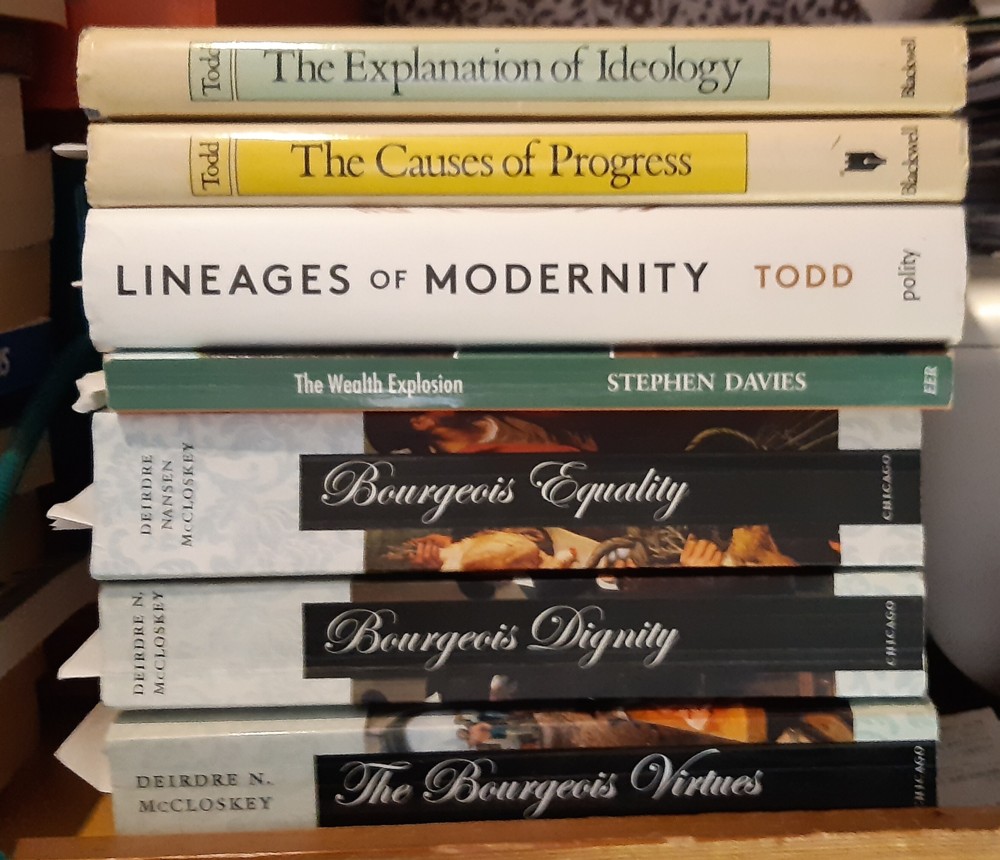In this posting here just over a week ago, I showed you all a pile of books, and said that if all went well I’d be recording a conversation with Patrick Crozier in which I’d speak about these books (plus the writings of Anton Howes). I had in mind how each writer provided a piece in the puzzle of how the Industrial Revolution came about, and that I was going to fit all these pieces together. Mass literacy, ideology, revolution, both political and industrial.
Well, last week, Patrick and I finally did manage to record this discussion, which was mostly a monologue by me with occasional queries from Patrick, and now you can listen to it, and read Patrick’s commentary and notes with more links, by going here.
The recording was a definite success in one way, which is that my voice functioned really well, better than I thought, about one month ago, that it ever would again.
The heart of my claim is that the Industrial Revolution had a lot more in common with the “other” revolutions, in places like France, Russia and China than is now usually supposed, in the following sense: The Industrial Revolution was also an ideological event. It happened because starry-eyed ideologists had a glorious plan for the betterment of mankind. Very long story very short: The plan worked, magnificently. But this is not a story which intelligent and educated people nowadays can compute. Revolution equals blood, chaos and a world that is the opposite of what the starry-eyed ideologists said it would be. What most educated people now seem to believe is that the Industrial Revolution happened by mistake, when selfish go-getters pursuing only the narrowest idea of their own selfish interests happened to have a huge but unintended collective consequence. I say that industrial improvement, even if not exactly the “revolution” that happened, was deliberate.
Between them, the writers I assembled and talked about explained all this, although it takes me to fit the various pieces of the story together, to tell it in full. Said he modestly.
And so on and forth, for over an hour. When this unbalanced “conversation” ended, I was disappointed, because of what I hadn’t managed to say. Basically I outlined a theory, but the way I told it, it was severely lacking in illustrative detail, as Patrick’s questions forced me to acknowledge. But listening again this afternoon, I was comforted by the fact that although that criticism stands, I did at least say some interesting things. I didn’t illustrate them, still less go any way towards proving them. But at least I said them, as best I could. Which is to say, I tried to.
LATER: I can’t make the comments system at Croziervision work, so I will have to put my embarrassing apology for saying that John Lilburne was executed here instead. I’m embarrassed. Sorry.
My problem was that I read all the books in the pile quite a while ago, remembered the broad outlines that I concluded from them and forgot most of the illustrative details and backup evidence. In this respect the delay doing this was unhelpful. I hope to be writing out, for Samizdata, the thesis I merely presented in this podcast and will then at least try to allude to rather more evidence than I did in this. But I promise nothing.







